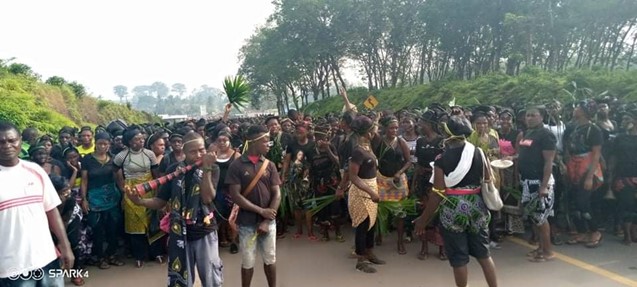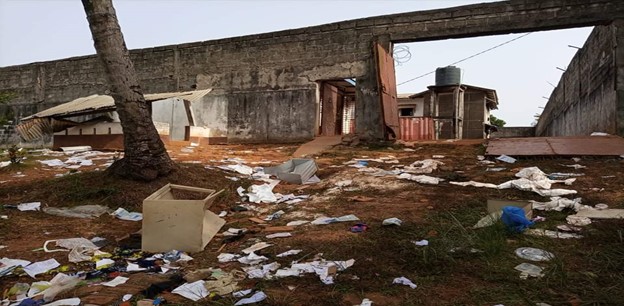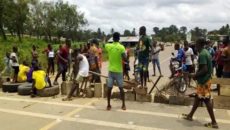PLEEBO, Maryland – Maryland has entered its fourth day of curfew since Pres. George Weah ordered the measure to restore calm to the southeastern county.
In response to angry protests over the gruesome death of a commercial motorcyclist, the president imposed a 6 p.m. to 6 a.m. curfew during a national address on Wednesday, March 31. The restrictions were effective on April 1 and are expected to remain in place until the government decides otherwise.
In his address, Weah reaffirmed his government’s commitment to protecting the lives and properties of all residents of Liberia.
“I would like to assure the people of Maryland County that this killing has claimed the urgent attention of the government and will be thoroughly, promptly, and fully investigated,” he said. “The perpetrators will face the full weight of the law.”
He told Marylanders to avoid taking the law into their own hands. The president promised that the criminal justice system would investigate the matter.
“This curfew will be strictly enforced by the police, who will be supported by the joint security forces,” Weah said. “All residents of Maryland County are advised to take heed and govern themselves accordingly.”
Since news broke out about the gruesome murder of 18-year-old motorcyclist Mordecial Nyemah in Gbolobo-Bessiken on March 25, an angry crowd of primarily motorcyclists took to the street demanding immediate justice for their colleague.
Police in Pleebo had already arrested 20-year-old Moses Malmah as the prime suspect after tipsters alerted them when they saw him with bloody clothes. Malmah later admitted to the police that he and three others had killed Nyemah, but he has not named the others yet.
On March 31, the women of Pleebo marched added pressure to the call for justice. They gathered, dressed in black, and marched through the streets of Pleebo, later moving to Harper, the county’s capital. There, they presented a petition to county leaders.
Chris D. Walker, who spoke on the group’s behalf, told journalists that the purpose of the peaceful march was to pressure the government for a speedy probe into what they believed was a ritualistic killing.
She promised that the group of women would continue to pressure the government until justice was served.
“Since March 25, 2021, our son was killed – we are yet to get redress from neither the local authorities nor the national government,” she said. “We are tired of this nasty act here.”
She also called on the police to provide the report for the investigation of a 2019 murder of another motorcyclist, Bill Myers. “We must get justice for our children, beginning with Mordecial Nyemah,” Walker said.

Pleebo women headed to Harper. Photo: Moses J. Dawoe
The protesting motorcyclists were less peaceful than the women. They allegedly vandalized the Harper Central Prison, leaving documents in the facility on fire and allowing several inmates to escape from the prison.
The protesters also attempted to burn the police station in Harper but were unsuccessful. They, however, succeeded in damaging the police’s only utility vehicle and took the battery.
The Harper police were limited in manpower and a reinforcement of Emergency Response Unit troops was later sent to calm the situation in Pleebo. The move further angered protestors, as they alleged to reporters that armed police officers were firing in the air and indiscriminately spraying teargas. Claiming without proof that Speaker Bhofal Chambers, who represents the district, had sent the armed police to intimidate protestors, they targeted the lawmaker’s house and set it on fire.
However, Alex Summerville, who heads the local motorcycle and tricycle union in Pleebo, has denied all allegations that his members have been responsible for the chaos in Maryland.
Instead, he told reporters the vandalizing was done by a group of unknown people dressed in white personal protective equipment. He said allegations that motorcyclists burned the speaker’s home or damaged the prison is only meant to undermine the motorcyclists’ struggle to see justice for their fallen colleague.
Maryland County Attorney Philip G. Weagar confirmed on radio that 91 inmates had escaped from the prison, including suspect Moses Malmah, who confessed to killing Nyemah.
Meanwhile, the Maryland County Legislative Caucus has condemned the violence in the county, including the destruction of public and private facilities. Rep. Isaac Roland of the county’s third district spoke on behalf of the caucus on April 1 in Monrovia. He said all Maryland lawmakers wanted to see justice for Mordecial Nyemah.
He said citizens had the constitutional right to assemble peacefully, but they should not cause harm to others or properties. Roland further added that Maryland lawmakers do not support ritualistic killings across the county and would work with investigators to book all those connected to the arson attacks in Harper and Pleebo.
Maryland has a long history of being a hotbed of ritualistic killings, where culprits murder individuals to use their body parts in rituals to give them a desired outcome, usually greater political power.
Many of the county’s past alleged ritualistic killings have seen no suspect arrested despite security personnel investigations.
In 2017, at least three alleged ritualistic killings took place that went unresolved.
On February 9, 2017, a 49-year-old watchman contractor with the Cavalla Rubber Corporation, Amos William, went missing and his lifeless body was discovered five days later after a search by over 150 men. Several body parts had been extracted from his corpse. Soon after, the body of a student of Pleebo High school was also discovered lying in a newly constructed culvert along the Pleebo-Karloken Highway.
According to the recently released U.S. Department of State human rights report on Liberia, the country struggles to contain ritualistic murders or deliver justice for its victims.
The report, which covered activities in 2020, read, “It remained difficult to obtain convictions for ritualistic killings in the court system because the justice system does not recognize traditional rites as judicable issues. There were reports of killings in which perpetrators removed body parts from the victims.”
David B. Kpanie and Moses J. Dawoe contributed to this article. Featured photo by Bryan B. Dioh Jr



